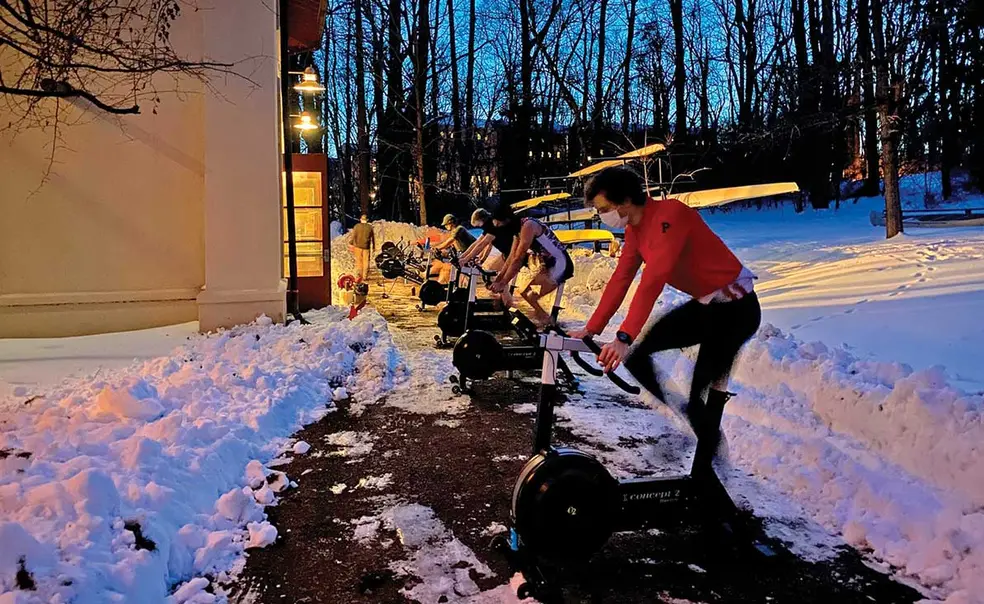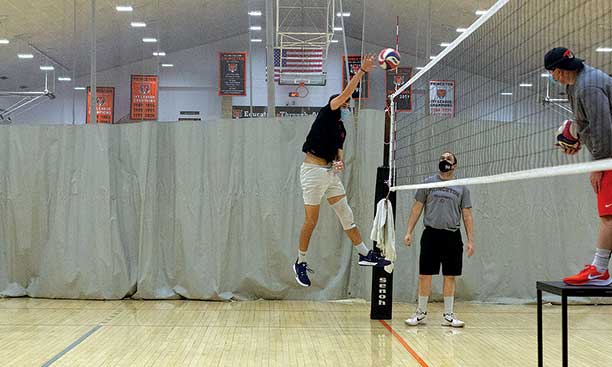Spring Sports Teams Find Ways to Play
With the spring conference season canceled, teams focus on training and more
Twin sisters Isabel and Fiona Max ’24, who run, respectively, middle and long distance for Princeton women’s track, are among those feeling the sting of a spring without intercollegiate competition: The spring conference season was canceled by the Ivy League in mid-February, continuing the policy put in place for fall and winter sports.
“The loss of the competition season has been a big thing,” Isabel said. “We’re here to compete. Everyone at Princeton is competitive.”
But the league’s decision did not spell the end of athletics at Princeton for the school year. Thanks to the low rate of COVID cases on campus, Princeton’s teams have been cleared to practice, provided players and coaches follow a rigorous set of safety protocols. Track and field athletes, for example, have been able to resume their usual practice format.
“Just running next to people has been amazing,” Isabel said. “It’s just a matter of perspective,” Fiona added. “The big realization at the end of the day is that running is running, and we’re lucky that we can do it.”
Michelle Eisenreich, their head coach, said the team is less affected by COVID restrictions than many other sports. “There’s no guarding or defending, so we’re naturally socially distant,” she explained.
If case numbers continue to drop, teams will be cleared for additional activity as part of a phased plan. For now, participants must wear masks at all times and remain at least 6 feet apart. The use of locker rooms is not permitted, and practice groups must not exceed 10 student-athletes. But players and coaches are thrilled to be practicing again, even under strange circumstances.
“Right now I’m just playing because I love the game, and it’s like I’m 8 years old again.” — Infielder Taylor Beckett ’21
The baseball team has also resumed fairly typical practices, with minimal COVID interference aside from the smaller practice groups. To keep things interesting without intercollegiate action, coach Scott Bradley has launched the COVID Cup, a series of modified intrasquad scrimmages. With a limited number of players at practice, there have been some unusual defensive alignments, including players manning positions they haven’t played since Little League.
The experience reminds infielder Taylor Beckett ’21 of his childhood in suburban Boston. “Right now I’m just playing because I love the game, and it’s like I’m 8 years old again,” he said. “In a typical season, I love having to worry about who’s our next opponent and which pitcher I’m facing. But there’s also something liberating about the mentality I have right now of, ‘I’m just playing because this is what I love to do.’”
Unlike track and baseball, the men’s volleyball team has faced significant interruptions due to protocols. “It’s not a great COVID sport,” head coach Sam Shweisky said. Many common volleyball drills — let alone full scrimmages — are not permitted, given the impossibility of staying 6 feet apart. But Shweisky has relished the opportunity for individual skill development outside of the crucible of a Division I volleyball season. “We get to really slow things down and look at video of individual guys,” he explained. “There’s no pressure. It’s not like we have to play Penn State in two weeks.”
The team has made the most of its added bandwidth off the court as well. As part of weekly team meetings on Zoom, a handful of the program’s Black alumni have been guiding the team and coaching staff through I’m Still Here, a book by Austin Channing Brown that addresses racial injustice in America. “It’s been great to really live the value that [athletics] isn’t just about sports at Princeton,” Shweisky explained. “Times like this you really see it.”
And as the weather began warming up in March, the team was looking forward to one more unique opportunity on campus. “As the weather gets nicer in the next few weeks, we might play a little beach volleyball,” Shweisky said. “I probably wouldn’t do that if we were preparing for matches. But hey, it’s a global pandemic. Let’s have a little fun.”













1 Response
Chuck Nafziger ’67
4 Years AgoTraining in Masks
After seeing the photo of the crew heavies working out with distancing and masks, I conclude that science, medicine, and common sense have escaped from our institutions of learning, even good ol’ PU.